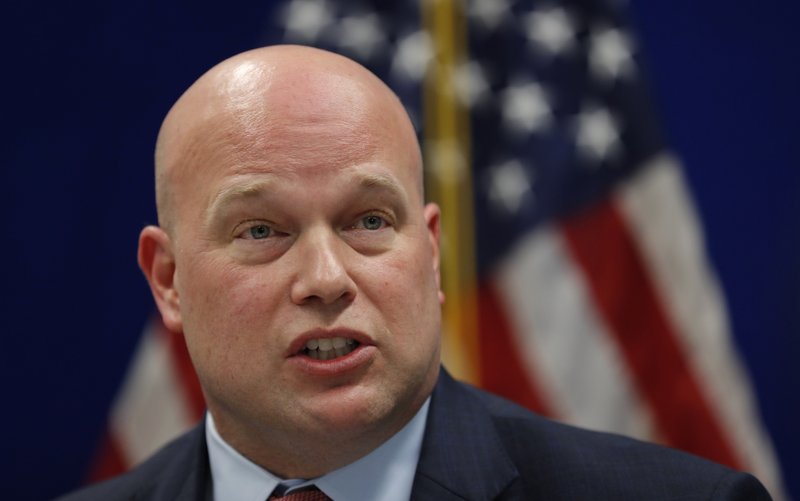WASHINGTON — The Justice Department on Wednesday released an internal legal opinion supporting the legality of Matthew Whitaker's appointment as acting attorney general as Democrats press the case that President Donald Trump violated the law and Constitution by making Whitaker the country's chief law enforcement officer.
The 20-page opinion from the Office of Legal Counsel, which provides advice to executive branch agencies, aims to rebut mounting complaints that Trump illegally sidestepped procedure by appointing Whitaker over Deputy Attorney General Rod Rosenstein. Rosenstein, the second-ranking Justice Department official, has been confirmed by the Senate and oversees special counsel Robert Mueller's Russia investigation.
Whitaker had been chief of staff to now-ousted Attorney General Jeff Sessions — a job that didn't require Senate confirmation. He became acting attorney general when Sessions was forced out on Nov. 7 and was given oversight of Mueller's inquiry.
Since then, the state of Maryland has challenged Whitaker's appointment, arguing that the top Justice Department job must be held by a Senate-confirmed official such as Rosenstein. Congressional Democrats have called the appointment unconstitutional and at least two former Republican attorneys general, Alberto Gonzales and Michael Mukasey, have raised questions about it as well.
It was unclear whether the legal opinion would satisfy opponents of Whitaker's appointment, but the document does provide by far the Justice Department's most detailed defense of the selection.
The opinion concludes that Whitaker, even without Senate confirmation, may serve in an acting capacity because he has been at the department for more than a year at a "sufficiently senior pay level."
The opinion tries to reconcile two seemingly conflicting statutes by saying that even though the department's own line of succession specifies that the deputy attorney general may hold the top spot in the event of a vacancy, a more general law known as the Vacancies Reform Act empowers presidents to depart from that order and promote officials who haven't been confirmed by the Senate.
Though Whitaker is not Senate confirmed and was not the deputy, the opinion concludes that he nonetheless satisfies a third element of the law by having been with the Justice Department for at least 90 days and earning high enough pay for consideration.
"As all three branches of government have long recognized, the President may designate an acting official to perform the duties of a vacant principal office, including a Cabinet office, even when the acting official has not been confirmed by the Senate," the opinion said.
The opinion identified more than 160 times before 1860 in which non-Senate officials were temporarily appointed to fill vacancies as Cabinet secretaries or equivalent jobs.
It said that both Presidents George W. Bush and Barack Obama had designated unconfirmed agency officials as acting agency heads, and that Whitaker was not the first unconfirmed official to run an agency on an interim basis in the Trump administration.
Even so, the opinion could identify only one instance, in 1866, when a non-Senate confirmed assistant attorney general became acting attorney general.
Read Thursday's Arkansas Democrat-Gazette for full details.
